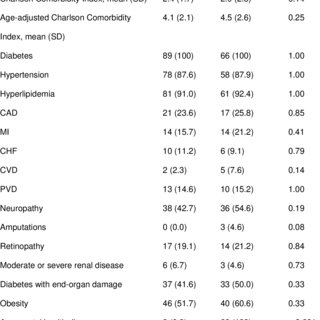
Annals of Pharmacotherapy, Ahead of Print.
Background: Previous studies show patients with type 2 diabetes (T2D) and a mental health (MH) disorder exhibit poorer glycemic control compared with those without. Objective: Compare mean change in glycosylated hemoglobin (A1C) after 6 months in the Diabetes Intense Medical Management (DIMM) “Tune Up” Clinic in patients with and without MH disorders. Methods: Retrospective cohort study in T2D patients, with A1C at baseline and 6 months, divided into subgroups of those with ≥1 MH diagnoses and without MH. Primary outcome was mean change in A1C from baseline to 6 months. Secondary outcomes were mean change in other metabolic parameters and proportion achieving A1C and related goals. Results: Of 155 patients meeting inclusion criteria, 66 (42.6%) had at least 1 MH disorder (MH group) and 89 (57.4%) did not (non-MH group). Mean A1C, fasting blood glucose (FBG), and triglycerides (TG) change (improvement) did not differ significantly between MH and non-MH groups at 6 months (eg, A1C reduction: −2.1% [SD = 2.0] vs −2.3% [SD = 2.1]; P = 0.61, respectively). Percentage at A1C goal did not differ significantly between groups, though a higher percentage of the non-MH group achieved FBG and TG goals than the MH group. Conclusion and Relevance: In 6 months, both groups in the DIMM clinic achieved a statistically significant mean A1C reduction (over 2%) with no statistical or clinical difference in the magnitude of change between groups. Patients with T2D benefitted from the DIMM model and personalized visits with a pharmacist regardless of having a MH disorder.
Background: Previous studies show patients with type 2 diabetes (T2D) and a mental health (MH) disorder exhibit poorer glycemic control compared with those without. Objective: Compare mean change in glycosylated hemoglobin (A1C) after 6 months in the Diabetes Intense Medical Management (DIMM) “Tune Up” Clinic in patients with and without MH disorders. Methods: Retrospective cohort study in T2D patients, with A1C at baseline and 6 months, divided into subgroups of those with ≥1 MH diagnoses and without MH. Primary outcome was mean change in A1C from baseline to 6 months. Secondary outcomes were mean change in other metabolic parameters and proportion achieving A1C and related goals. Results: Of 155 patients meeting inclusion criteria, 66 (42.6%) had at least 1 MH disorder (MH group) and 89 (57.4%) did not (non-MH group). Mean A1C, fasting blood glucose (FBG), and triglycerides (TG) change (improvement) did not differ significantly between MH and non-MH groups at 6 months (eg, A1C reduction: −2.1% [SD = 2.0] vs −2.3% [SD = 2.1]; P = 0.61, respectively). Percentage at A1C goal did not differ significantly between groups, though a higher percentage of the non-MH group achieved FBG and TG goals than the MH group. Conclusion and Relevance: In 6 months, both groups in the DIMM clinic achieved a statistically significant mean A1C reduction (over 2%) with no statistical or clinical difference in the magnitude of change between groups. Patients with T2D benefitted from the DIMM model and personalized visits with a pharmacist regardless of having a MH disorder.
